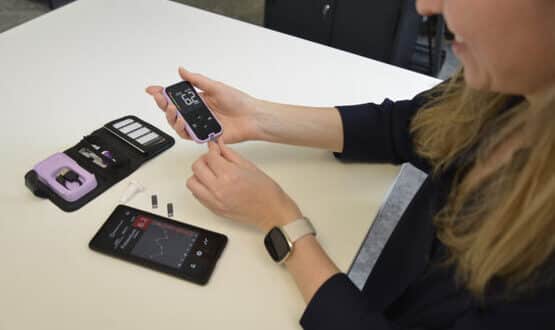Cambridge spinout moves towards clinical evaluation after R&D success

Kalium Health, a Cambridge University spinout developing an at-home blood potassium test, recently signed a major R&D partnership and has now gathered enough data to begin preparing for clinical evaluation.
Kalium is developing an integrated device-software platform that provides a rapid and quantitative electrolyte readout from just a single drop of blood. The company’s first target is accurate monitoring of potassium levels to improve the management of Chronic Kidney Disease (CKD).
Potassium balance in the body is critical and is normally regulated by the kidneys. However, people with CKD cannot effectively manage their potassium level so are at risk of imbalance, where potassium can build up in their body and reach dangerous levels without them knowing.
Currently, doctors require patients to attend clinical settings for regular, invasive blood draws – but samples need laboratory analysis which makes real-time monitoring and timely treatment impossible. This is a major problem because high blood potassium levels (hyperkalaemia) can cause cardiac arrest.
Kalium Health recently agreed a major R&D partnership with Fresenius Medical Care, a major provider of products and services for people with CKD. The companies came together to integrate Kalium’s sensor technology into future kidney care products.
Kalium carried out extensive testing with Fresenius’ dialysis products to build up a large body of measurement data that led to new insights about real-world sensor behaviour as potassium changes.
Kalium’s technology provides an exciting opportunity to enable treatment to be optimised for each individual patient and supports the transition of kidney care from in-centre to in-home.
Prototype test milestone
The company also recently celebrated the manufacture of 100,000 prototype tests, a major milestone that has enabled it to generate and analyse huge amounts of laboratory and pre-clinical data.
This was essential to demonstrate that Kalium can manufacture reliably, at scale and at an unbeatable cost, and clears the path for the company’s next phase of clinical evaluation.
Evaluating Kalium’s technology with patients is a critical step towards regulatory approval. The company is now working with clinical partners to carry out studies demonstrating the technology in real-world settings.
Following this, and in response to increasing demand at home and overseas, Kalium will complete validation activities leading to international regulatory approvals.
Kalium’s sensing technology uses 100 times less blood than traditional test methods and is pocket-sized and minimally-invasive, making it suitable for use by visiting nurses and patients themselves. Secure digital connectivity ensures the appropriate collection and sharing of data with Electronic Health Records.
The company is actively exploring new partnerships, particularly with US value-based kidney care providers and pharmaceutical companies conducting clinical trials of cardiorenal medications.
Tom Collings, CEO at Kalium Health, said: “I am delighted with the advances in technology that we have made following our recent expansion and investment in upgraded facilities.
“We are pleased to have recently attracted the attention of major US investors who recognise the huge opportunity to provide remote monitoring of Chronic Kidney Disease, which affects 1 in 7 of the population and now consumes over 24% of Medicare costs.
“With significant pre-clinical data in hand, we are confident that our technology can transform the management of kidney disease and positively impact the lives of many of the 800 million patients living with CKD.”
Craig Kamerath, senior scientist at Fresenius Medical Care North America, added: “We are excited to be collaborating towards our shared goal of improving the quality of life of patients with kidney failure.
“The marriage of Kalium Health’s sensor technologies with our future products brings about tremendous possibilities for improving the lives of our patients.”
The CKD diagnostics market is a growing one. In June, French company CardioRenal said its TENOR device had obtained Breakthrough Device Designation from the Center for Devices and Radiological Health (CDRH) of the US Food and Drug Administration.
The connected medical device combines multiple innovative technologies to assist patients with chronic illnesses, including CKD, in measuring their blood potassium levels at home.



